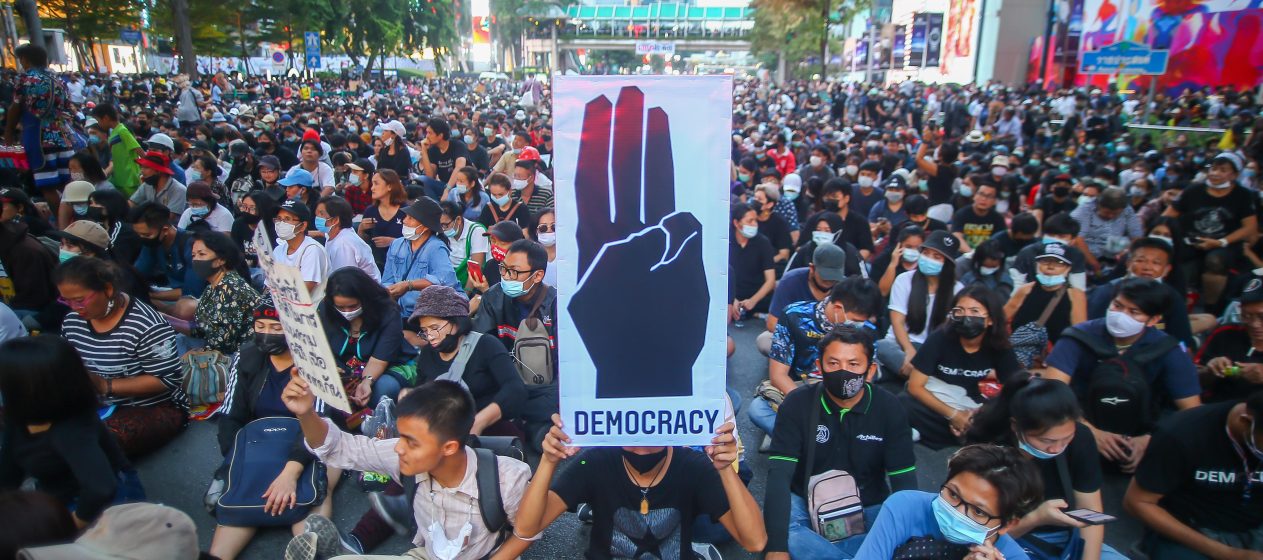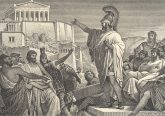The latest mass uprisings in Thailand have driven a wedge between people who remained complacent towards the status quo and people who sought to upend what they saw as conservative authoritarianism by resorting to rally politics. The latter wished to take matters into their own hands and steer the country in a more democratic direction as faith in mainstream political actors dwindled. Should marginalized civil-society actors not take drastic measures, future political trajectories will remain shrouded in conservative mist. A military coup in 2014 had enabled the conservative establishment to tighten its grip on the country’s politics. This is not a one-off incident but a recurring pattern in Thailand’s modern history. Via military coups, conservative forces have always found a way to reassert themselves in mainstream politics.
What is interesting is how the ensuing political tug of war between people from opposite sides of the ideological spectrum also speaks of a tension between the center and periphery of Thai politics. As activities in the periphery began to mount, challenges to centered notions of peoplehood and dominant conservative institutions like the military and a hitherto untouchable monarchy became more pronounced. Yet, political developments in Thailand on the whole seem to be of peripheral concern to political theorists in the West, in particular those who identify with mainstream normative analytic political theory. This is unfortunate, not least because only a while ago Thailand was the site of arguably one of the most polarised mass conflicts in recent memory— the conflict between the undemocratic Yellow Shirts and the comparatively more democracy-leaning Red Shirts, which was not only a fascinatingly layered and context-specific political event worthy of critical analysis, but also representative of how outstanding ideological differences, if left unattended, may pit partisans against one another in a way that undermines rather than encourages cross-ideological democratic dialogue. Now, being witnessed is a reprisal of this involving new actors and forms of ideological identification. At stake, a plurality of voices yearning to be heard.
Is the global community simply oblivious to what is/was happening in Thailand? Or does this have more to do with how the normative orientation of mainstream analytic political theory is situated? When asked what value can be attributed to periphery cases like Thailand – where the centre represents ideal democracies against which non-ideal ones are measured – the answer appears to be little. This is evinced in the comparative politics literature which typically regards Thailand as a good example of countries that are bad or subpar at democratisation. If a consensus among political theorists sets the bar for what political systems are worth looking into from a normative standpoint, thenThailand may well be beneath that bar.
Indeed, it is worth bearing in mind that democratic idealism in Thailand is and always has been heavily influenced by Western traditions and genealogies. This is because those at the periphery view such ways of thinking as empowering vis-à-vis their powerful conservative adversaries at the centre. Consider how Thailand’s military and monarchy countenance a shared sense of community rooted in national tradition and a preconceived notion of national identity. It follows that adherence to dominant conceptions of ‘Thai-ness’ is a condition of full membership of the political community. In response, those at the periphery opted to identify themselves as belonging to a different kind of political association, namely one that is voluntary and more egalitarian in the broadest sense of the term. The duality that unfolds is a people in the sense of demos and a people in the sense of nation.
This raises the question of how periphery politics in Thailand can help uncover alternative ways of thinking about democracy when heterodoxy, above all, seems to take its conceptual bearings from Western ideals, blueprints and notions of democratic progress. The answer is that the specificity of the Thai struggle for democracy yields broader implications for the theorisation of democracy in an increasingly conflict-ridden world. Perhaps, the ideological nature of mass conflicts in Thailand, which appeared to be thwarting ‘democratic progress’, can provide normatively salient entry points for envisaging democratic engagement under non-ideal conditions—i.e. circumstances where power asymmetries and ideological incompatibilities are glaring and prove difficult to assuage. This is not to suggest that Thailand can never become like the West and vice versa. Being suggested is that the polarity between ideal and non-ideal cases yields an enumerable range of political possibilities which any ‘realistic’ normative political theory must strive to accommodate. So much so that it could be argued that the bar for valuable forms of political thinking should be set lower than most political theorists care to admit. This would enable the messy realities of ideological contestation and struggles for power to have a more pronounced role in normative theorising. The pertinent question is how can a more nuanced understanding of ideology and its concrete manifestations delimit democratically justifiable forms of ideological conflict from democratically unjustifiable ones.
Thai politics, therefore, highlights the salience of the ‘centre-periphery’ dynamic in at least two respects. First, it shows how disempowered Thais sought to de-centre orthodox conceptions of people by ushering in new moments of peoplehood from the periphery and galvanising the ‘awakened’ masses to act as a people. Second, it signifies how the non-ideal character of Thai (democratic) politics in relation to its more idealised Western counterparts can broaden the scholarship of democratic theory and practice. Political commentators will do well to look beyond the fact that Thailand is undoubtedly famed for its uninterrupted history of military coups, which, if anything, only sets it widely apart from archetypical Western liberal democracies (since lately even the most established democracies are not spared from polarising ideological conflicts). Meanwhile, disempowered Thais ought to acknowledge that there is more to reshaping the country’s politics than depicting it along the lines of democratic idealism.
The good news is that recent methodological reflections in political theory should render it easier for Thai politics to move closer towards the normative centre of political theory. The first of these methodological reflections is the advent of comparative political theory, which deals specifically with fostering dialogue between Western and non-Western traditions of political thought. The second follows from the realist revival in political theory, beginning with Bernard William’s seminal discussion of realism and moralism, which seeks to distribute normative weight across a range of context-specific situations.
Chaturongkul, Dulyaphab. 2022. ‘Thailand’s ideological struggle: Depolarizing Thailand’s polarized politics’, Journal of Political Ideologies (forthcoming), doi: 10.1080/13569317.2021.1873470.
Jenco, Leigh. 2015. Changing Referents: Learning Across Space and Time in China and the West (Oxford: Oxford Univerty Press, 2015).
Subrahmanyan, Arjun. 2021. Amnesia: A History of Democratic Idealism in Modern Thailand (New York: State University of New York Press, 2021).
Tejapira, Kasian. 2016. ‘The irony of democratization and the decline of royal hegemony in Thailand’, Southeast Asian Studies, 5 (2016), pp. 219–237.
Williams, Bernard. 2005. ‘Realism and moralism in political theory’, in Bernard Williams (Ed) In the Beginning Was the Deed (Princeton: Princeton University Press, 2005), pp. 1–17.







